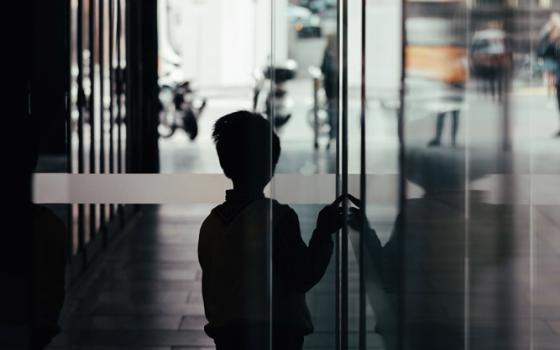Most likely you have a memory of your own like this. I was 5 or 6, following a step or two behind my mom as she browsed the aisles at our local department store. I'm not sure what happened next.
Maybe I was distracted by a display of shiny objects farther afield, or perhaps I was playing an imaginary game, as I was apt do to, when suddenly, I looked around and ... my mom was lost. I was alone. Strangers were all the eye could see in any direction.
Having since happened upon lost kids in department stores as an adult, I have an idea of the wild look that must have taken over my face as I looked up and down and all around, looking for my mom while wet tears began to fill my big brown eyes. I can also imagine the sheer panic that must have overcome my mother as she realized I was not by her side.
Of course this story has a happy ending. We were reunited quickly. Friendly strangers and store personnel helped us to find one another. I do remember the utter relief that swept over me when my mom's arms were wrapped securely around me again, tight. "Everything is OK," her embrace said wordlessly to me. The minutes we were separated felt like an eternity, but we were back together, and nothing would separate us again.
I have found myself reflecting on this common childhood experience as I read stories and watch images of children forcibly separated from their parents at the U.S. border, by our government, in our name. Human beings treated as creatures unworthy of dignity or human rights.
We are witnesses to children not only taken from their parents, but then held, alone, in jail-like conditions, for days and even months. We are witnesses to children forbidden from even hugging their siblings during this traumatic experience. We are witnesses to children detained, alone, with strangers who do not seem to want to help them find their mom or dad.
What is wrong with us as human beings? How can we allow this to happen in our names? How can elected officials and policy makers think this is OK?
Sadly, this sordid event of our history-in-the-making is not without precedent. At our worst moments we have placed entire families of Japanese descent in internment camps. In addition to fleeing violence, war and genocide, our immigrant ancestors fled various inhumane practices of other governments — such as letting entire populations starve during the potato famine.
Human beings have a nasty habit of losing touch with our humanity. We declare as "other" those we deem different than ourselves. We turn a blind eye to — or worse, condone — inhumane practices against those others who are somehow not deserving of the same protections and respect we demand and expect for people like ourselves.
This is dangerous territory. Thankfully, at critical moments we have come together as a human family and stepped away from the brink. In the wake of the atrocities of the Nazi Holocaust, for example, the global community — inspired in part by global leaders such as Eleanor Roosevelt — declared boldly in the U.N. Universal Declaration of Human Rights: "No one shall be subjected to torture or to cruel, inhuman or degrading treatment or punishment."
The hope was to support and affirm human dignity definitively, and to ensure that such atrocities never again tore our human family apart. The Second Vatican Council declared in Gaudium et Spes, "Whatever insults human dignity, such as subhuman living conditions, arbitrary imprisonment, deportation … are infamies indeed."
Yet here we are in the latest chapter of the consequences of losing our grip on humanity, with a new flavor of infamy — the separation of families at the border. How can this be?
Fear seems to be a major factor that leads us to step over the brink. Think back to our recent history — the 9/11 attacks and the "war on terror." While the U.S. government had been an active leader on the international scene in the work to prohibit state-sponsored torture following World War II, our fear of terrorist attacks quickly led to a striking shift in our national role, from that of advocate against to perpetrator of state-sponsored torture.
Perhaps even more disturbing is that the general public shifted right along with these national policies and decided torture was not only justified, it was OK. A 2012 poll by The Huffington Post found that 63 percent believed that the use of torture against suspected terrorists was justified in some cases. Only 25 percent answered that torture is never justified.
I have not seen poll numbers regarding our current situation, but I know that we are in a deeply polarized time in our society.
This is a soul-searching moment. We need to find our way to the right side of history. We need to challenge unjust and inhumane actions by our government. We need to find our way from fear to courage, to see the humanity in those human persons we have decided to treat as the undeserving "other."
Just like that moment I remember being embraced by my mother as a lost little girl, we need to find our own humanity as a people once again. We need to hold it tight and promise never to lose it again.
And so I pray, Creator God, you who gifted us with our human family, help us to see the dignity of all our brothers and sisters, to work for justice for the poor and marginalized, to treat one another with respect, and to always remember that your love and mercy is greater than our biggest fears. Amen.
[Susan Rose Francois is a member of the Congregation Leadership Team for the Sisters of St. Joseph of Peace. She was a Bernardin scholar at Catholic Theological Union and has ministered as a justice educator and advocate. Read more of her work on her blog, At the Corner of Susan and St. Joseph.]

